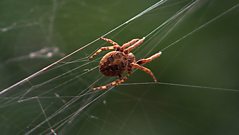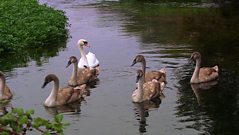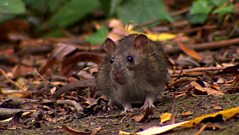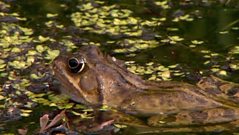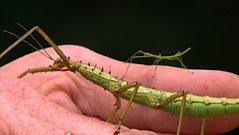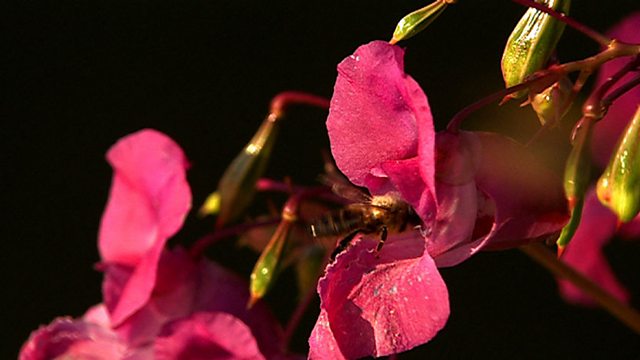
Exotic escapee
Exploding seed pods guarantee the spread of Himalayan balsam.
A classic English river, but the swathes of pink flowers are definitely not British. Most people know this stuff is called Himalayan balsam. It didn’t fly in from the Himalayas of its own accord, of course, it was grown in greenhouses and in about 1830 inevitably some plants were thrown out or some seeds escaped and now it’s all over the place. A lot of people say it’s a foreigner, it shouldn’t be here - but it’s the only colour along this river at the moment and it’s rather lovely. The flowers have got an English colloquial name, which is rather sweet. It’s called ‘policeman’s helmet’. There are two major aspects to why a plant should spread the way Himalayan balsam does. The first one is ease of pollination - and you can see there are bees coming here non-stop. The seeds then have to be able to disperse, that’s the second important thing. And frankly there's nothing that can disperse seeds quite as dramatically as Himalayan balsam - they literally explode. Of course they don’t rely on wildlife presenters, or anybody else to come along and pop the seeds. They will do it of their own accord. These exploding seedpods guarantee that not only will the Himalayan balsam spread here, but of course it’s by the river so they'll float off wherever the river may take them. Which is why you can see Himalayan balsam all over Britain.
Duration:
This clip is from
Featured in...
![]()
�鶹�� Nature
Be captivated, informed and inspired by the world's wildlife.
More clips from A Dorset River
-
![]()
September spiders
Duration: 02:06
-
![]()
Silent noise
Duration: 02:06
-
![]()
Ratty the rat?
Duration: 02:02
-
![]()
Changing times
Duration: 02:38
More clips from Bill Oddie's How to Watch Wildlife
-
![]()
Egg chatter—Series 2, Kielder Forest
Duration: 02:25
-
![]()
Garden oases—Series 2, Homes and Gardens
Duration: 01:59
-
![]()
September spiders—Series 2, A Dorset River
Duration: 02:06
-
![]()
Prickly stick insect—Series 2, Homes and Gardens
Duration: 02:53


